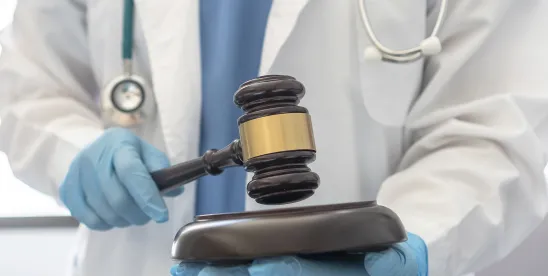Since day one, a policy priority of the Administration has been to discourage and prevent gender-affirming care for children and adolescents that involves surgery or medication.
Recent actions show a concerted effort across multiple federal agencies to achieve this goal.
Background
Among the earliest actions by the Administration were two Executive Orders directed at transgender health care: EO 14168, “Defending Women From Gender Ideology Extremism and Restoring Biological Truth to the Federal Government,” and EO 14187, “Protecting Children From Chemical and Surgical Mutilation.” These Executive Orders immediately were challenged in federal courts. Ultimately, permanent injunctions were entered in the Western District of Washington and the District of Maryland against portions of the Executive Orders. Those injunctions are on appeal in the Ninth and Fourth Circuits.
Nevertheless, the Administration has continued to pursue its policy objectives through a mix of agency actions and communications, often disclaiming reliance on the Executive Orders and referring to other legal sources as the basis for a variety of agency actions.
The Administration’s multi-agency strategy to combat gender-affirming care, or what it refers to as “sex-trait modification procedures,” is taking shape.
HHS Report
On May 1, 2025, the Department of Health and Human Services issued a 409-page report entitled “Treatment for Pediatric Gender Dysphoria: Review of Evidence and Best Practices” (“HHS Report”). Many recent agency actions since have cited this document. Generally speaking, the HHS Report challenges the validity of the “gender-affirming” model of care as lacking scientific and medical support, notes irreversible risks associated with “pediatric medical transition,” and recommends psychotherapy as a “noninvasive alternative to endocrine and surgical interventions for the treatment of pediatric gender dysphoria.”
Interestingly, the HHS Report accepts that gender dysphoria is a diagnosis recognized by the mainstream medical and scientific community. In that sense, the HHS Report may be contrary to the position of the Administration: Section 5 of EO 14187 instructed the Secretary of HHS to take “appropriate actions” regarding “the Eleventh Revision of the International Classification of Diseases and other federally funded manuals, including the Diagnostic and Statistical Manual of Mental Disorders, Fifth Edition.”
The HHS Report has been received with intense criticism for having anonymous authors and not being subject to peer review.
Enforcement and Investigations
There have been multiple announcements and actions from HHS and the Department of Justice (“DOJ”) demonstrating the intent to disrupt gender-affirming care.
On May 28, 2025, Centers for Medicare & Medicaid Services (“CMS”) Administrator Dr. Mehmet Oz sent a letter to unnamed institutions entitled “Urgent Review of Quality Standards and Gender Transition Procedures.” Citing the HHS Report, the letter expressed “serious concerns with medical interventions for gender dysphoria in children.” It went on to request a set of documents and data, including policies, procedures, protocols, adverse event reports, and “complete financial data for all pediatric sex trait modifications performed at your institution and paid, in whole or in part, by the federal government.” The focus of the data request was surgeries, but the letter also referred to medication treatment. A response to the Oz letter was due within 30 days, or by June 27.
Significantly, not long before the Oz letter, CMS had updated its website with a page entitled “Quality, Safety & Oversight – Enforcement.” The page noted reasons why a provider agreement could be terminated, including a failure “to supply information necessary to determine whether payments are or were due and the amounts of such payments” and a refusal “to permit examination of fiscal and other records.” CMS pointed out that these rules applied to the Medicaid program as well as Medicare. In some states, much gender-affirming care is paid by Medicaid. Termination of a federal provider agreement is generally viewed as a death sentence to a major provider such as a hospital.
On June 30, 2025, three days after the response deadline set by the Oz letter, the Wall Street Journal ran an “exclusive” story with the headline “Trump Administration Weighs Eliminating Funds for Hospitals Offering Gender Care for Minors.” The article listed nine hospitals that received the Oz letter, citing an “HHS official.” It also quoted “CMS officials” who said the “agency is reviewing its authority to kick hospitals out of Medicaid altogether if they don’t cease providing the surgeries.”
On the same date as the Oz letter, May 28, 2025, HHS Secretary Kennedy sent a letter to “Health Care Providers, Health Care Risk Managers, and State Medical Boards,” advising them to “read with care” the HHS Report. The letter went on to discuss protections for “whistleblowers who make reports concerning these harmful interventions for minors, including for waste, fraud, and abuse in HHS-funded programs,” and referred to actions to “hold providers that harm children accountable.”
The DOJ’s position previously had been set forth in detail by the Attorney General in a “Memorandum to Select Component Heads” dated April 22, 2025. Entitled “Preventing the Mutilation of American Children,” the AG’s Memorandum described a five-part plan “to enforce rigorous protections and hold accountable those who prey on vulnerable children and their parents.”
The AG’s Memorandum was followed by two additional documents, known as the “Blanche Memorandum” and “Shumate Memorandum,” after DOJ officials who issued them. Both set forth enforcement priorities for the DOJ’s Civil Division.
The Blanche Memorandum, dated May 19, 2025, focused on use of the False Claims Act “against those who defraud the United State by taking its money while knowingly violating civil rights laws.” It did not specifically call out gender-affirming care, but announced formation of the Civil Rights Fraud Initiative, to be co-led by the DOJ’s Civil Fraud Section and Civil Rights Division, with both an internal DOJ team and participation by all 93 U.S. Attorney’s offices. The Blanche Memorandum also discussed partnerships with other federal agencies, including HHS, along with state attorneys general and local law enforcement.
The Shumate Memorandum followed on June 11, 2025. It set forth a set of priorities for the Civil Rights Fraud Initiative, one of which is “protection of women and children.” Citing the two Executive Orders as well as the Bondi Memorandum, the Shumate Memorandum stated that DOJ would “use all available resources to prioritize investigations of doctors, hospitals, pharmaceutical companies, and other appropriate entities.” Among the examples was coding fraud: “providers who attempt to evade state bans on gender dysphoria treatments by knowing submitting claims to Medicaid with false diagnosis codes.” The False Claims Act and Food, Drug, and Cosmetic Act were highlighted.
Then, on July 2, 2025, DOJ and HHS collectively announced the DOJ-HHS False Claims Act Working Group. The announcement explained that “HHS shall make referrals to DOJ of potential violations of the FCA that reflect Working Group priorities” – which would include gender-affirming care, since the announcement cited the Shumate Memorandum.
All of this points to imminent enforcement by the Administration directed to organizations and individuals involved with treatment of gender dysphoria by surgery and medication-assisted treatment. The agencies’ available tools include investigations, subpoenas, civil investigative demands, citations, court actions, injunctions, and termination of federal funds. In fact, in a brief press release on July 9, 2025, DOJ announced that more than twenty subpoenas had been served on hospitals and doctors that provide gender related treatment for minors. The identities of the recipients have not yet been announced.
Federal Trade Commission
The Federal Trade Commission describes its mission as “protecting the public from deceptive or unfair business practices and from unfair methods of competition through law enforcement, advocacy, research, and education.”
Under the FTC Act, the agency has broad investigative authority, including non-public investigations, subpoenas, civil investigative demands, and studies. This authority includes the ability to share information confidentially with other enforcement agencies. Following an investigation, the FTC has enforcement authority, which includes both internal agency and judicial proceedings. Enforcement includes civil penalties, consumer remedies, and injunctions. Finally, the FTC has rulemaking authority.
On July 9, 2025, the same day that DOJ announced the subpoenas to providers, the FTC held an all-day workshop, intended to “help the FTC to understand whether consumers are being or have been exposed to false or unsupported claims about ‘gender-affirming care’ and to gauge the harms consumers may be experiencing.” There was something of a mismatch between this statement of intent and the title of the event: “The Dangers of ‘Gender-Affirming Care’ for Minors.”
Following this event and whatever understanding the FTC gained from it, investigation, enforcement, and rulemaking activity can be expected. There was a suggestion during the workshop that the FTC would serve its own subpoenas.
Pharmaceutical Pipeline
The Shumate Memorandum referred to priority investigations of various entities for possible legal violations, specifically mentioning “possible violations of the Food, Drug, and Cosmetic Act and other laws by (1) pharmaceutical companies that manufacture drugs used in connection with so-called gender transition and (2) dealers such as online pharmacies suspected of illegally selling such drugs.” Drugs used for gender-affirming care are FDA approved and have a variety of medical uses. However, use of legal drugs for illegitimate purposes was the heart of the opioid crisis and related criminal, civil, and regulatory actions. The Administration may be looking at stopping medication-based gender-affirming care by choking off the supply. And the use of the term “dealers” clearly was intended to send a message to the industry of risks of federal action in this area.
Tip Lines
Federal agencies also have turned to the public for leads on gender-affirming care that may violate federal law. HHS has an online portal for complaints and encourages reports to the HHS Office of Inspector General hotline. On April 14, 2025, HHS announced a complaint portal for reporting “chemical and surgical mutilation of children and published guidance for whistleblowers. HHS has issued two related documents: “Guidance for Whistleblowers on the Chemical and Surgical Mutilation of Children” and “Whistleblower Tips and Complaints Regarding the Chemical and Surgical Mutilation of Children.” The first offers alternative methods of making reports to HHS.
On June 2, 2025, the FBI posted this message online:

Prosecution Threats
EO 14187 instructed the Attorney General to review DOJ enforcement of 18 U.S.C. § 116, which makes “female genital mutilation” a crime. The requests in the Oz letter include information that would show where surgery of this type has been performed – if at all. Nevertheless, while no surgeon would want to be the test case, prosecution under this law may be challenging: 18 U.S.C. § 116(b)(1) provides that “a surgical operation is not a violation of this section if the operation is… necessary to the health of the person on whom it is performed, and is performed by a person licensed in the place of its performance as a medical practitioner.” A key issue will be whether the records appropriately show the operation’s medical necessity for the health of the person.
The FBI tip request suggests DOJ may be looking at other criminal laws. Based on the theory that gender-affirming care is medically unnecessary, health care fraud laws may be used, including 18 U.S.C. § 1347 (health care fraud) and 31 U.S.C. §§ 3729-3733 (False Claims Act). Use of these statutes to prosecute medical professionals who are providing treatment endorsed by leading medical societies would be unprecedented, but that may not be a deterrent to this Administration.
Coverage and Reimbursement
Separate from enforcement actions that might result in loss of federal funding, CMS has undertaken rulemaking directed at reimbursement for gender-affirming care. On June 25, 2025, after notice and comment rulemaking, CMS issued final regulations regarding the Affordable Care Act’s (“ACA”) health insurance exchanges. One of the regulations prohibits health insurers from providing coverage for “sex-trait modification procedures” as an essential health benefit (“EHB”). EHBs have greater protections under the ACA.
HHS noted that health insurers could still cover these procedures. In addition, states may still require them to be covered, but in that case, states may need to cover the cost of the services.
In response to comments, HHS staked out the position that its action did not conflict with injunctions against the Executive Orders because it was based on “independent legal authority.” Within days, litigation was filed against some of the regulations, but did not include a challenge to the portion regarding sex-trait modification procedures. Given that the Final Rule is not effective until late August 2025, we may yet see such a challenge.
Tension with State Laws and Other Federal Laws
As we have pointed out before, there is a building tension between state laws and the Administration’s efforts to restrict or prevent medication and surgical gender-affirming care, especially for minors. There are numerous examples of legal battles ahead as the federal government’s multi-agency initiatives develop. In some states, gender identity is a protected class, and denial of care for that reason violates antidiscrimination laws. Some states require coverage of gender-affirming care in their health insurance markets. Licensing boards in certain states prohibit discrimination based on gender identity, without express exceptions for religious refusal.
And federal-state clashes are not the only ones. There remains much to be litigated in the area of federal protections. A close assessment of the recent Skrmetti decision by the United States Supreme Court, upholding Tennessee’s ban on certain gender-affirming care, suggests its holding may have been narrower than initially thought. There are numerous cases around the country in which a variety of transgender health care issues are before the courts.
Takeaways
What we saw for several months was a show of force by the Administration intended to warn organizations and individuals about the potential consequences of continuing to provide surgical and medication treatment to children for gender dysphoria. With the issuance of DOJ subpoenas, the actual use of force has now started.
Although the legality of many potential agency actions is very much open to question, few organizations or providers, if any, want to become the test case for the Administration’s enforcement initiatives. Nevertheless, legal cases and challenges seem inevitable.
Those involved in this difficult area will want to consider the following actions:
- Review relevant policies and procedures, including those relating to informed consent
- Consider billing and coding audits, and review clinical documentation practices, to ensure accuracy and compliance with evolving regulations and developments
- Understand the HHS Review – while there may be disagreement with its approach and conclusions, it is an important government study that merits consideration
- Understand dual obligations under both federal and state law, although there may be areas where they are irreconcilable
- State agencies and licensing boards may provide guidance or legal support
- Assess the value of second opinions, or even committee review, before undertaking gender-affirming care
- Evaluate the impact of the federal court injunctions against the Executive Orders that remain in place in two federal courts
- Consult with legal, risk, compliance, and ethics professionals
- Have a media and communications strategy in place for potential publicity about federal investigation or enforcement activity







 />i
/>i
